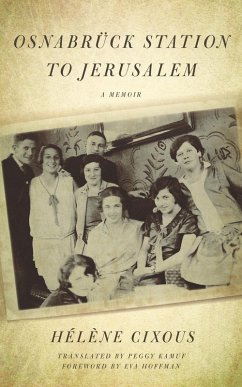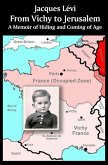An inventive blend of memoir and family history that ponders those who didn't flee their German town in time: "Powerfully reclaimed-and imagined-reality." -The Jewish Chronicle Winner, French Voices Award for Excellence in Publication and Translation For about eighty years, the Jonas family of Osnabrück were part of a small but vibrant Jewish community in this mid-size city of Lower Saxony. After the war, Osnabrück counted not a single Jew. Most had been deported and murdered in the camps; others emigrated-if they could, and if they managed to overcome their own inertia. It is this inertia and failure to escape that Hélène Cixous seeks to account for in Osnabrück Station to Jerusalem. Vicious anti-Semitism hounded Osnabrück's Jews long before the Nazis' rise to power in 1933. So why did people wait to leave when the threat was so clear? Drawn from the stories told to Cixous by her mother, Ève, and grandmother, Rosalie (Rosi), this literary work reimagines fragments of Ève's and Rosi's stories, including the death of Ève's uncle, Onkel André. Piecing together the story of Andreas Jonas from what she was told and from what she envisions, Cixous recounts the tragedy of the one she calls the King Lear of Osnabrück, who followed his daughter to Jerusalem only to be sent away by her, returning to Osnabrück in time to be deported to a death camp. Cixous wanders the streets of the city she'd heard about all her life, digs into its archives, meets city officials, all the while wondering if she should have come. These reflections in the present are woven with scenes from her childhood in Algeria and the half-remembered, half-invented stories of the Jonas family, making Osnabrück Station to Jerusalem one of the author's most intensely engaging books. "An inventive literary account of Cixous's remarkable journey to her mother's birthplace and of the Jewish community of a German town that was wiped out in the Holocaust." -Literary Hub, "The Best of the University Presses" This work received the French Voices Award for excellence in publication and translation. French Voices is a program created and funded by the French Embassy in the United States and FACE (French American Cultural Exchange).
Dieser Download kann aus rechtlichen Gründen nur mit Rechnungsadresse in A, B, BG, CY, CZ, D, DK, EW, E, FIN, F, GR, HR, H, IRL, I, LT, L, LR, M, NL, PL, P, R, S, SLO, SK ausgeliefert werden.









